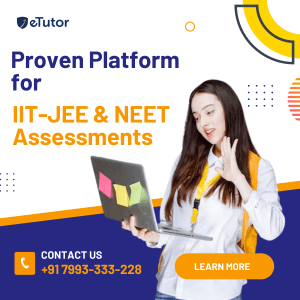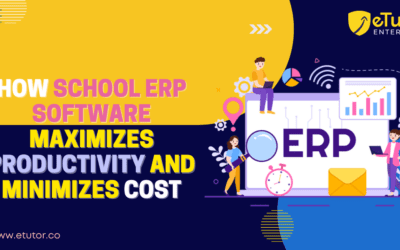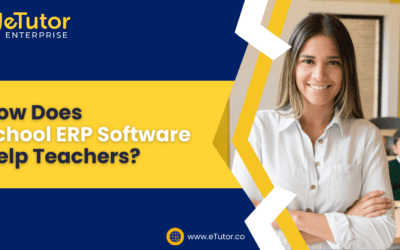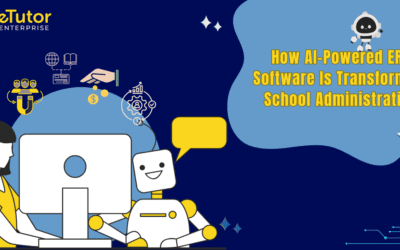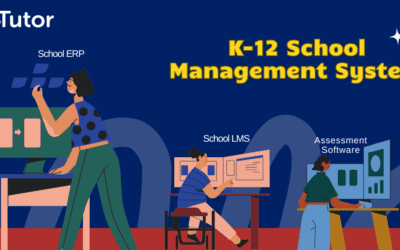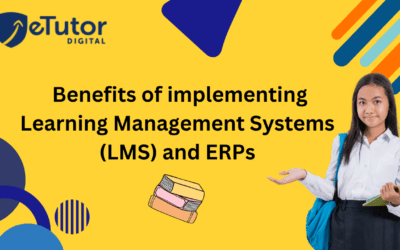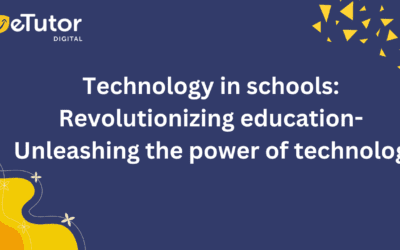Streamlining School Management with Education ERP Software
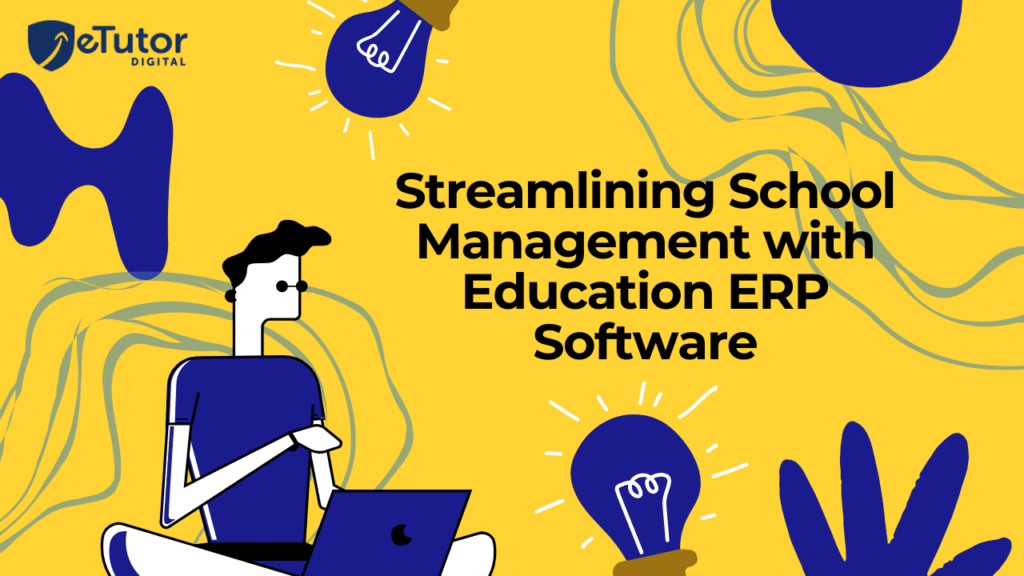
Table of Contents
ToggleIntroduction
In contrast to the traditional educational system, 21st-century education has undergone a profound transformation, marked by a supreme focus on customization and innovation. Modern educational frameworks are significantly influenced by cutting-edge AI technologies, that are reshaping and retaining the information transfer process.
When coming to educational institutions, they accumulate vast amounts of on a daily basis, encompassing student records, teacher details, staff information, course particulars, fee structures, and course schedules, etc.
Without the integration of comprehensive Education Enterprise Resource Planning (ERP) software within the school infrastructure, this wealth of data remains untapped and impractical for utilization.
School management software acts as a unifying force, bringing together disparate data streams into a centralized and cohesive platform. This transformative technology facilitates seamless communication and collaboration across various departments, allowing schools to harness the full potential of their data resources. Here we will discuss about the ERP Implementation Methodologies and how eTutor’s ERP helps in modernizing the school operations.
Why is school management software key to success?
Education ERP software stands as a pivotal tool in ensuring the success of educational institutions, offering a multitude of advantages that significantly contribute to enhanced productivity, efficiency, and overall effectiveness. The implementation of such school management software brings about a transformative impact on various aspects of school operations, reinforcing its importance in today’s educational context.
Implementing Education ERP software provides schools with a centralized platform for managing all administrative processes. The integrated database ensures that critical information is readily accessible, allowing for streamlined control over diverse functions such as admissions, attendance tracking, examinations, and financial transactions. This consolidated approach not only simplifies operations but also minimizes the risk of errors and promotes data accuracy.
Education ERP software aims to strengthen connectivity among all stakeholders within the school community, fostering effective communication and collaboration. By bringing students, educators, parents, and staff onto a unified platform, the software facilitates seamless information sharing.
This ensures that stakeholders can easily find the necessary information, receive timely updates, and obtain swift answers to their queries, ultimately promoting a more engaged and connected educational ecosystem.
In today’s digital age, the new generation of learners is inherently technology-focused. Education ERP software recognizes this reality and serves as a flexible and agile solution capable of adapting to the latest technological requirements of students. By incorporating smart technologies, such as online learning modules, interactive interfaces, and mobile applications, ERP software aligns with the evolving needs and preferences of tech-savvy students, creating a dynamic and modern learning environment.
One of the significant benefits of school management software is its ability to provide streamlined, centralized, and integrated reporting capabilities. Schools can access essential analytics related to fees, student records, academic performance, and more in real-time.
This streamlined reporting not only facilitates data-driven decision-making for administrators but also enables educators to track student progress effectively, identify areas for improvement, and implement targeted interventions.
Latest ERP Implementation Methodologies for Simplifying School Management
The success of ERP implementation greatly depends on the chosen methodology. In the dynamic landscape of education technology, several latest ERP implementation methodologies cater to diverse school needs.
Each methodology has its own set of advantages and disadvantages, making it crucial for schools to align their choice with their specific requirements.
1.Agile Methodology:
Agile methodology is characterized by its emphasis on iterative development and continual improvement. The system is divided into smaller phases known as sprints, each completed within short timeframes. This approach enables schools to deliver a working product swiftly, allowing for responsiveness to changing needs.
Agile is particularly beneficial when the requirements are not well-defined initially, providing flexibility throughout the implementation process.
2.Waterfall Methodology:
Considered a traditional approach, the waterfall methodology involves breaking down the ERP implementation process into sequential phases.
Each phase is completed before moving on to the next. This methodology is suitable for projects with well-defined needs and a static scope. It offers a structured and systematic progression, making it easier to manage and control each stage of the implementation process.
3.Hybrid Methodology:
The hybrid methodology combines elements of both agile and waterfall approaches. This flexible approach allows for adaptation to changing needs while ensuring that project milestones are met on time.
By striking a balance between structure and flexibility, the hybrid methodology accommodates the evolving requirements of schools during the ERP implementation process.
4.DevOps Methodology:
DevOps methodology emphasizes continuous integration and delivery of software. In this approach, operations and development teams collaborate closely to streamline processes efficiently and reduce time to market.
DevOps is particularly effective in ensuring a seamless transition between development and deployment phases, enhancing overall efficiency in ERP implementation.
5.Rapid Application Development (RAD) Methodology:
RAD methodology focuses on building a working prototype quickly, gathering feedback from stakeholders, and incorporating improvements iteratively.
This approach is ideal for schools that value stakeholder input and prioritize rapid development. RAD ensures that the final ERP product aligns closely with the expectations and requirements of the school community.
How is eTutor’s ERP Modernizing Education?
eTutor’s ERP software emerges as a transformative solution, modernizing education by seamlessly integrating technology into various aspects of school management.
This software not only enables efficient monitoring of students’ performance but also offers a plethora of features that cater to the diverse needs of school stakeholders.
eTutor’s ERP software facilitates swift and efficient monitoring of students’ performance. With the eTutor School ERP software, schools can seamlessly switch between different modes of operation (offline, online, or a combination of both).
The administration gains the ability to upload learning materials directly by connecting to the school’s YouTube channel, adding new subjects, and assigning teachers with ease.
eTutor ERP provides exceptional feasibility to every school stakeholder, making it a reliable domestic ERP software. School owners are equipped with an app that enables them to transform their schools into tech-enabled environments, offering real-time tracking of operations and more.
Principals benefit from eTutor’s ERP by gaining access to performance reports, professional networks, and teacher training workshops. The ERP system for schools empowers principals to make informed decisions and stay actively involved in enhancing the overall educational experience.
Parents are kept well-informed through eTutor’s ERP, receiving updates on homework, unit progress, and assessments. The Student and Parent App encourages engagement by allowing students to access live classes, ask questions, and participate in real-time quizzes from the comfort of their homes.
Conclusion:
eTutor’s ERP is at the forefront of restructuring schools, making them future-ready by harnessing the power of technology. Education ERP software, such as eTutor, not only streamlines administrative processes but also enhances communication, efficiency, and decision-making through real-time data.
The comprehensive features cater to the diverse needs of school stakeholders, making it an indispensable tool for modern educational institutions. To transform your school into a leading 21st-century institution, consider partnering with eTutor today and embrace the future of education.
Recent Posts
- NTA-Based Hybrid Assessment Software for IIT-JEE Mains, Advanced & NEET
- eTutor Offline Exam Software for IIT-JEE, NEET, and Foundation with Student Performance Analytics
- NEET Test Generator for Academies & K-12 Schools
- How School ERP Software Maximizes Productivity and Minimizes Cost
- How Does ERP Software for Schools Help Educators?
